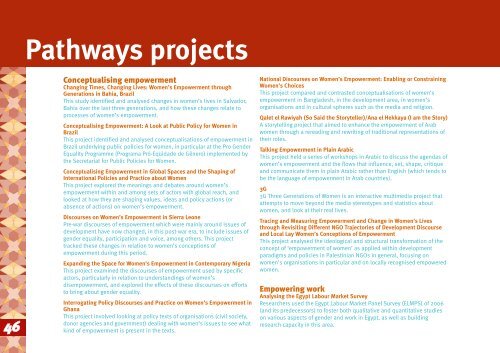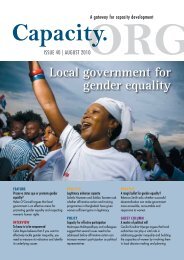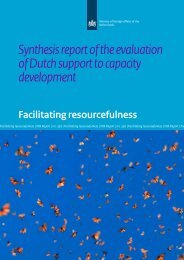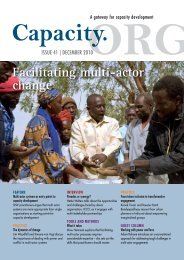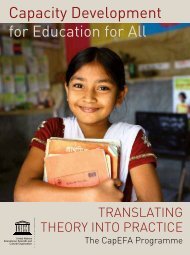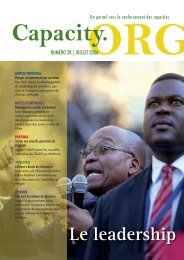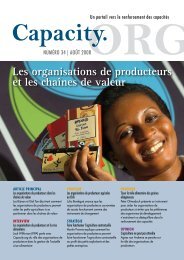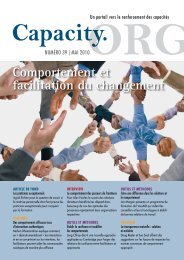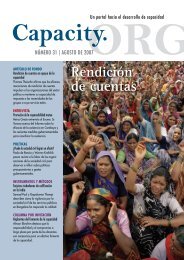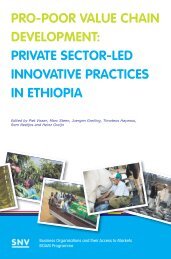Empowerment: A journey not a destination - Capacity.org
Empowerment: A journey not a destination - Capacity.org
Empowerment: A journey not a destination - Capacity.org
You also want an ePaper? Increase the reach of your titles
YUMPU automatically turns print PDFs into web optimized ePapers that Google loves.
Pathways projects46Conceptualising empowermentChanging Times, Changing Lives: Women’s <strong>Empowerment</strong> throughGenerations in Bahia, BrazilThis study identified and analysed changes in women’s lives in Salvador,Bahia over the last three generations, and how these changes relate toprocesses of women’s empowerment.Conceptualising <strong>Empowerment</strong>: A Look at Public Policy for Women inBrazilThis project identified and analysed conceptualisations of empowerment inBrazil underlying public policies for women, in particular at the Pro GenderEquality Programme (Programa Pró-Eqüidade de Gênero) implemented bythe Secretariat for Public Policies for Women.Conceptualising <strong>Empowerment</strong> in Global Spaces and the Shaping ofInternational Policies and Practice about WomenThis project explored the meanings and debates around women’sempowerment within and among sets of actors with global reach, andlooked at how they are shaping values, ideas and policy actions (orabsence of actions) on women’s empowerment.Discourses on Women’s <strong>Empowerment</strong> in Sierra LeonePre-war discourses of empowerment which were mainly around issues ofdevelopment have now changed, in this post-war era, to include issues ofgender equality, participation and voice, among others. This projecttracked these changes in relation to women’s conceptions ofempowerment during this period.Expanding the Space for Women’s <strong>Empowerment</strong> in Contemporary NigeriaThis project examined the discourses ofempowermentused byspecificactors, particularly in relation to understandings of women’sdisempowerment, and explored the effects of these discourses on effortsto bring about gender equality.Interrogating Policy Discourses and Practice on Women’s <strong>Empowerment</strong> inGhanaThis project involved looking at policy texts of <strong>org</strong>anisations (civil society,donor agencies and government) dealing with women’s issues to see whatkind of empowerment is present in the texts.National Discourses on Women’s <strong>Empowerment</strong>: Enabling or ConstrainingWomen’s ChoicesThis project compared and contrasted conceptualisations of women’sempowerment in Bangladesh, in the development area, in women’s<strong>org</strong>anisations and in cultural spheres such as the media and religion.Qalet el Rawiyah (So Said the Storyteller)/Ana el Hekkaya (I am the Story)A storytelling project that aimed to enhance the empowerment of Arabwomen through a rereading and rewriting of traditional representations oftheir roles.Talking <strong>Empowerment</strong> in Plain ArabicThis project held a series of workshops in Arabic to discuss the agendas ofwomen’s empowerment and the flows that influence, set, shape, critiqueand communicate them in plain Arabic rather than English (which tends tobe the language of empowerment in Arab countries).3G3G Three Generations of Women is an interactive multimedia project thatattempts to move beyond the media stereotypes and statistics aboutwomen, and look at their real lives.Tracing and Measuring <strong>Empowerment</strong> and Change in Women’s Livesthrough Revisiting Different NGO Trajectories ofDevelopmentDiscourseand Local Lay Women’s Conceptions of <strong>Empowerment</strong>This project analysed the ideological and structural transformation of theconcept of ‘empowerment of women’ as applied within developmentparadigms and policies in Palestinian NGOs in general, focusing onwomen’s <strong>org</strong>anisations in particular and on locally recognised empoweredwomen.Empowering workAnalysing the Egypt Labour Market SurveyResearchers used the Egypt Labour Market Panel Survey (ELMPS) of 2006(and its predecessors) to foster both qualitative and quantitative studieson various aspects of gender and work in Egypt, as well as buildingresearch capacity in this area.


